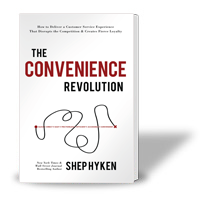Brand Book Bites from The Convenience Revolution
Here’s my write-up of the best bites and my takeaways from Shep Hyken’s new book, The Convenience Revolution: How to Deliver a Customer Service Experience That Disrupts the Competition and Creates Fierce Loyalty.
– the book: The Convenience Revolution: How to Deliver a Customer Service Experience That Disrupts the Competition and Creates Fierce Loyalty is yet another terrific book from Shep Hyken, Hall of Fame speaker, and New York Times and Wall Street Journal bestselling author.
– the brains: Shep is so widely known for his work with and keynotes to companies and organizations who want to build loyal relationships with their customers and employees that he’s achieved that rare one-name status, like Jay-Z and Madonna. Just say “Shep” and everyone knows who you’re talking about. He’s also written so many books, I’ve lost count, but perhaps my favorite is Be Amazing Or Go Home.
– the best bits: The premise of the book is:
“Customers will pay for convenience. And they’ll choose to do more business with the people and companies that make their lives more convenient!”
Here are the six principles of the Convenience Revolution that the book serves up, along with my favorite excerpts about each:
- Reduce friction – Friction occurs in business when one set of customer expectations rubs up against an obstacle, e.g., shipping delay, poor employee attitude, out-of-stock product. “The antithesis of an experience with friction is one that is easy for the customer.”
- Shep explains, “All things being equal, the customer will gravitate toward the option that is easiest to use. Reducing friction is the tie-breaker.”
- Self-service – Shep offers two cautionary notes about this principle:
- “Self-service is an ongoing commitment, not something you cross off a list. The self-service bar is constantly being raised, and the tools are always getting better.”
- “Lots of self-service ideas sound good in theory, but end up backfiring. The big question to ask is whether a self-service option makes life easier or more difficult for a customer in execution. This means you need to test your ideas before you roll them out on a large scale.”
- Technology — Shep defines technology as “those tools that I am expected to use regularly that either DO or DO NOT give me the information, resources and outcomes I need, when I need them.”
- And he observes, “All too often, the technology we use doesn’t deliver a positive experience. It adds friction. It makes our lives more stressful and frustrating, not less so. Marketplace advantage accrues for those who can help customers move from experiencing technology as something that is traditionally inconvenient to something that delivers forward- thinking convenience.”
- Subscription – This refers to the recurring subscription model, which is “a powerful and potentially transformative business offering in virtually any contemporary market.”
- Subscriptions only work, though, if we “follow through on the ease, reliability and consistency that is implied by any subscription relationship.” We can’t lure people with a low-ball sign-up fee and then assume they’re locked in so we can raise our prices. Only if we consistently deliver on the full value that we promised them will customers be happy and stick with us.
- Delivery – Delivery is a “powerhouse.” The right delivery offering saves customers time, gives customers more control over the experience, and saves customers’ attention (meaning, delivery gives a customer one less thing to worry about.)
- Shep writes, “As many companies have learned, their customers are often willing to pay a little extra – or quite a bit extra – for expedited delivery. In these cases, they factor the convenience of delivery into the overall value equation. That means offering a delivery option can sometimes help you compete against price.
- Access – “Access simply means going where the customer is,” Shep writes. “For some companies, access means creating and supporting enough physical locations to serve the target market they’ve identified in a way that supports convenience. For some companies, access means giving customers user-friendly communication tools through which the customer experience plays out remotely without adding friction.”
The Convenience Revolution is chockful examples from a wide-ranging list of companies from well-known convenience superstars such as Uber and Netflix to more unknown players such as Moby Mart (a solar-powered mobile convenience store that navigates multiple locations during the course of a day) and Tom James Company (which has been making and delivering fine, personally-tailored clothing since 1966.)
And at the end of each chapter, you’ll find a convenient (!) “The Takeaways” box that summarizes the key points and provides a series of questions designed to help you apply the principle to your business.
– the bottom line: Shep is a pro at writing books that are extremely easy to read and intensely practical. The Convenience Revolution is no exception. I highly recommend it for anyone who needs to get a handle on how to exceed customer expectations today – and who doesn’t?!
The book comes out on October 2, 2018, but if you pre-order here, you can get the e-book today! Woo hoo!
P.S. Shep also hosts a podcast called The Amazing Business Radio Show and he’s been kind enough to interview me about my books. Check out our amazing conversations about What Great Brands Do and FUSION.